Martin Luther King
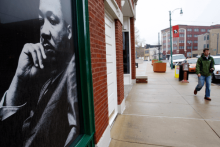
No Christian leader has influenced my faith and activism as much as Rev. Martin Luther King Jr. — but the day we devote to his legacy often leaves me frustrated. There’s a bitter irony in a nation that takes a day off to celebrate King’s life and work while that same nation is experiencing a deep backlash against racial justice.

In a time like this, prayer is not perfunctory, an add on, or a brief closing to a meeting. Rather it is an opening to what indeed has now become “spiritual warfare” as the New Testament describes.
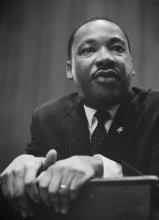
Jewish scholar Abraham Joshua Heschel introduced Martin Luther King, Jr. to a rabbinical assembly in 1968, “a voice, a vision, and a way.”
“The whole future of America will depend on the impact and influence of Dr. King,” Heschel said.
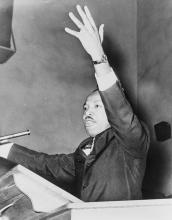
“All flesh shall see the salvation of God” (Luke 3:1-6). Well, that depends.
It depends on where you are from. It depends on your country of origin. It depends on your religion. It depends on with whom you are associated. It depends on your race, your ethnicity, your gender, your sexual orientation. The list of criteria for salvation, contrived predominantly from our many fears, is long according to the world as we know it today, but not according to the Gospel of Luke. And since Luke is providing a particular portrait of Jesus, not according to Jesus either.
This passage from Luke for the Second Sunday of Advent points to competing worldviews. The opening verses are deceptively subversive. Into the religious reigns and imperial kingdoms of the first century C.E., the word of God comes. Emperor Tiberius, Pontius Pilate, Herod, Philip, Annas, and Caiaphas will have to tend with the rule of the word of God, a rule that insists on salvation for all.

Religious institutions have, at times, been at the forefront of progress by engaging society with forceful spiritual leadership. The engagement of Cesar Chavez and the United Farm Workers grape boycott in the 1960s, for example, was part phenomenal leadership, part righteous struggle.
And while most Americans know the pivotal impact of Rev. Dr. Martin Luther King, Jr., and the Southern Christian Leadership Conference in the Civil Rights Movement, there were many other leaders who held prominent roles in similar religiously-inspired movements. Rev. Dr. Anna Howard Shaw (1847-1919), for example, overcame enormous discrimination and was not only ordained as a minister, but also earned a medical degree from Boston University.
Shaw was a formidable speaker, and lectured throughout the United States and Europe in favor of women’s suffrage, temperance, and progressive causes she believed would relieve the exploitation of women.

I love Martin Luther King. I wrote my master’s thesis on his approach to nonviolence. King is the greatest prophet in the history of the United States. And white people should know him better.
Blitzer, like so many white people, doesn’t know Martin Luther King. He misses King’s point. If white people want to reference King, we need to stop using him to condemn black violence. We need to stop pitting a black man against black people. It’s patronizing. It’s demeaning. And it misses the point.
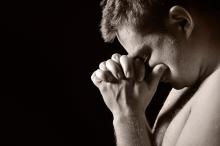
I’m asked pretty often what I see for the future of organized religion, and Christianity in the West in particular. Given the fact that I am in the process of completing a book called “ postChristian ,” some people make assumptions that I am convinced it’s all going away.
Granted, Christianity has experienced precipitous decline, and the drop-off likely is far from done. Before we see any leveling-off within the institutional church, there will be many more church closures, consolidation of shrinking denominations, and an increasing number of people called to, and already working in, ministry who supplement their income with some non-ministerial side vocation.
So what do we, who still operate within the system of a declining religion, do about our situation? Some of this has little or nothing to do with anything the church has done or can do. Our increasingly distributed, decentralized, and accelerated culture has forced churches out of the center of American social life. Also, changing cultural norms have made it much more socially acceptable not to go to church.
I’ve long suggested that many of the folks filling the pews during the so-called heyday of the Church some 40 to 60 years ago were there under some duress. They went because of community pressure to do so, because their spouses made them, or because it was a great place to do business networking. But honestly, were we any better off as a faith to have our buildings full if the folks who were there didn’t really want to be there?
Forty-five years ago today, the Rev. Dr. Martin Luther King delivered his now-famous speech at Riverside Church in New York City, declaring his opposition to the war in Vietnam. One year later -- 44 years ago today -- he was murdered by an assassin.
It is fitting that these anniversaries occur this year during the week we commemorate the death and celebrate the resurrection of Jesus.
Dr. King’s Riverside speech is frequently quoted, with his scathing political indictment of the war and the systems of exploitation and oppression that led to it. But how often do we remember that he began that speech by noting that while the Nobel Peace Prize was “a commission to work harder than I had ever worked before,” it was not the most important thing. He continued by saying that:
This is a calling that takes me beyond national allegiances, but even if it were not present I would yet have to live with the meaning of my commitment to the ministry of Jesus Christ. To me the relationship of this ministry to the making of peace is so obvious that I sometimes marvel at those who ask me why I'm speaking against the war. Could it be that they do not know that the good news was meant for all … Have they forgotten that my ministry is in obedience to the One who loved his enemies so fully that he died for them?
Dr. King was able to be the leader he was, take the risks he did, and ultimately make the final sacrifice, because he knew who called him and who he followed. He knew that the sacrificial death and resurrection of Jesus was a living presence in his life and gave him the hope to follow.
For him, as well as us, believing in Jesus means being a follower and a disciple in bringing the kingdom he lived and taught. By raising Jesus, by vindicating his life and death, God vindicated his message – the kingdom he proclaimed has come and will come. And because God raised Jesus from death, his living presence continues among us and we are empowered to follow him and to live the kingdom. The resurrection is the event on which our faith and hope depends.
That faith sustained Dr. King, and it can sustain us.
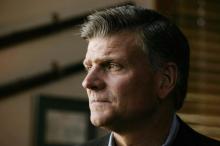
When Franklin Graham expressed doubts about President Obama’s Christian faith during and interview on Morning Joe last week, it reminded me of an uncomfortable dinner I had in the late ‘90s.
I sat down for a pleasant meal in the home of two great friends — one of them a white evangelical faith leader deeply committed to social justice. Well into the evening’s conversation —when we’d dropped all our pretenses and our exchanges moved well past mealtime niceties — one friend asked me something that caught me entirely off guard.
“Do you think Martin Luther King, Jr. was a Christian?” he said.
I was dumbstruck. I had never heard anyone actually ask that question before.
“Yes,” I replied. “What would make you doubt that?”
As he explained, it became clear: My friend wasn’t sure whether Dr. King was a Christian because King’s Christianity didn’t look like my friend’s Christianity.
Sojourners has always tried to understand and advocate for "biblical politics." But what does that mean now, especially as we approach another major election?
I was talking the other day to a Christian leader who has given his life to working with the poor. His approach is very grassroots -- he lives in a poor, virtually all-minority community and provides basic services for low-income people. He said, "If you work with and for the poor, you inevitably run into injustice." In other words, poverty isn't caused by accident. There are unjust systems and structures that create and perpetuate poverty and human suffering. And service alone is never enough; working to change both the attitudes and institutional arrangements that cause poverty is required.
As the tenth anniversary of 9/11 approaches, many of us are wondering how best to honor the many victims of that tragedy and its aftermath.
Here in Cincinnati, my wife Marty's answer is inviting some of our friends to join us on a walk with some Muslim and Jewish families she invited by simply calling their congregations. She got the idea from my friends and me at Abraham's Path, who are sponsoring www.911walks.org to help people find or pull together their own 9/11 Walks all over the USA and around the world. The goal of these walks is simple: to help people honor all the victims of 9/11 by walking and talking kindly with neighbors and strangers, in celebration of our common humanity and in defiance of fear, misunderstanding, and hatred.
On his radio show last week, Glenn Beck read a vow of nonviolence, which he said he'd been working on for about a year, and pleaded his followers to take it as well. The pledge itself is actually quite good, and even Gandhian, at parts. Here is an excerpt:
Today, quarters of the Earth are endangered by tyranny, discrimination, barbarism, and subjugation by fellow man. With an understanding of basic rights and equal justice, we must remain loyal to God and deliver the rights which [God's] benevolence has bestowed upon us to those who have been denied the blessings of liberty, justice, and equality. More importantly, we must protect them from being robbed in the future, so that forever the world may be safe, and her people free from malevolence. Together, we must be prepared to do our duty no matter the cost and we must do so inexorably. We must march forth steadfast and unconquerable and defeat the forces of evil not by sword, but through our love for mankind and his creator.
Rose Berger from Sojourners magazine spoke to the hundreds of us gathered in Lafayette Park just before we processed to the fence surrounding the White House. She mentioned the irony of building a monument to Dr. Martin Luther King, Jr. by the powerful political forces who disregarded or dismissed his message during his lifetime -- we only honor him after he is safely dead. How ironic also that the dedication of the monument was postponed by the most recent example of significant climate change. Will evidence of climate change begin to also signal political change?
Rose called on us to take up the banner of the Living Spirit of Dr. King within ourselves and allow it to inspire us as we risked arrest by calling on President Obama to take a clear stand to help protect our environment and begin to make a U-turn from the climate change path we are traveling as a nation and culture. We are part of a two-week vigil and civil disobedience action calling the president to deny permission for building the proposed Keystone XL Pipeline from the environmentally devastating tar sands/oil shale development in Alberta, Canada to refineries in Texas.
The forthcoming dedication of the national memorial monument honoring Rev. Dr. Martin Luther King, Jr., affords an opening for considering the complexity and meaning of his leadership. He was not the tamed and desiccated civil hero as often portrayed in the United States around the time of his birthday, celebrated as a national holiday. He was until the moment of his death raising issues that challenged the conventional wisdom on poverty and racism, but also concerning war and peace.
King was in St. Joseph's Infirmary, Atlanta, for exhaustion and a viral infection when it was reported that he would receive the 1964 Nobel Peace Prize. As Gary M. Pomerantz writes in Where Peachtree Meets Sweet Auburn, this was the apparent cost exacted by intelligence surveillance efforts and the pressures of learning that Attorney General Robert F. Kennedy had formally approved wiretaps by the Federal Bureau of Investigation. His evolving strength as a leader is revealed in his remarks in Norway that December, which linked the nonviolent struggle of the U.S. civil rights movement to the entire planet's need for disarmament.
The rioting and rampages that spread across English cities last week have caused severe property destruction and raised public alarm. Writing in London's Guardian, community organizer Stafford Scott describes how he was among the group that on August 6 sought information from the police in Tottenham, a poorer section of London. They wanted an official statement on whether Mark Duggan had been killed by police bullets, as had been reported in the news.
All we really wanted was an explanation of what was going on. We needed to hear directly from the police. We waited for hours outside the station for a senior officer to speak with the family, in a demonstration led by young women. A woman-only delegation went into the station, as we wanted to ensure that this did not become confrontational. It was when the young women, many with children, decided to call it a day that the atmosphere changed, and guys in the crowd started to voice and then act out their frustrations.
This event is what most media accounts have identified as the spark that set England on fire, which has caught the world by surprise. Yet, says Scott, "If the rioting was a surprise, people weren't looking."
Being a socialentrepreneur used to be a lonely endeavor. I grew up believing that to be in business meant leaving your soul at the front door -- being ruthless, shrewd, and above all focused on profitability at any cost. But as a businessman, I found myself less interested in the bottom line of profit than in the bottom line of community impact. For example, I started Busboys and Poets as a restaurant and gathering place, but also a social enterprise -- a business with a conscience -- in Washington, D.C.'s U Street neighborhood.
Having grown up in D.C., I was amazed at the dramatic changes that swept various neighborhoods in the 1990s. The U Street corridor in particular was undergoing some of the most vivid transformation.
The Christianized Jesus -- the turning of a radical into a conservative shadow of his former self -- explains our problem of establishing and celebrating freedom fighters today. It is important that our progressive heroes be given their deserved fame, an accurately reported fame, and this is crucial in ways that impact our own activism.
Jesus of Nazareth was not a Peak Performance Strategist as the prosperity preachers would have it. Nor was he a foreigner-hating patriot as the tea party would argue. Obviously American politicians and their lobbyists pursue so many policies that are against the teachings of Jesus but are supported by mainstream Christian opinion. In fact, Jesus' parables and sayings push the spiritual revolution of gift economies, and of justice through radical forgiveness.
!['Civil Rights March on Washington, D.C. [Dr. Martin Luther King, Jr., President of the Southern Christian Leadership Conference, and Mathew Ahmann, Executive Director of the National Catholic Conference for Interrracial Justice, in a crowd.], 08/28/1963' photo (c) 1963, The U.S. National Archives - license: http://www.flickr.com/commons/usage/](http://lh3.ggpht.com/-XUAmAA_vWKI/Ti7l4ZavSOI/AAAAAAAACS8/0Y0EfQ03QzA/Flickr-4101511358.jpg) How should music rank among the ever-growing list of time-tested nonviolent methods such as boycotts, marches, strikes, sit-ins, and vigils?
How should music rank among the ever-growing list of time-tested nonviolent methods such as boycotts, marches, strikes, sit-ins, and vigils?
Anthony Shadid of the New York Times reports that a song, "Come on Bashar, Leave," is spreading across Syria, boldly calling on President Bashar al-Assad to step down. (Bryan Farrell also wrote about it at the Waging Nonviolence blog.) The article suggests that a young cement layer who chanted it in demonstrations was pulled from the Orontes River this month, his throat having been cut, and, according to residents of the city of Hama, his vocal chords torn out. Hama is where, in 1982, then-president Hafez al-Assad, father of the current president named in the song, gave orders to the army to massacre more than 10,000 in putting down an Islamist upheaval. Today, boys 6-years-old and older vocalize their own rendition of the original warbler's song instead. As the song has sped across Syria, demonstrators have adopted it for themselves.
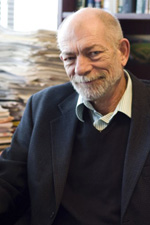 My office has two overflowing bookshelves, with more books stacked on top and on the windowsill. But above my desk within easy reach is a small shelf. On it I keep those books I most regularly use in thinking and writing. Here are the top 10.
My office has two overflowing bookshelves, with more books stacked on top and on the windowsill. But above my desk within easy reach is a small shelf. On it I keep those books I most regularly use in thinking and writing. Here are the top 10.
1. The Bible: What can I say about the foundational source of God's guidance in everything? I read or refer to it nearly every day. It was given to us "for teaching, for reproof, for correction, and for training in righteousness" (2 Timothy 3:16).
2. The Book of Common Prayer: I am not Anglican/Episcopalian, but there is something in the formal prayers of the traditional liturgy that resonate with my soul. On those days I really don't feel like praying or can't find the words, it's comforting to have a place to turn for inspiration.
This past weekend, Christians around the world celebrated one of our holiest holi-days: Pentecost. Pentecost, which means "50 days," is celebrated seven weeks after Easter (hence the 50), and marks the birthday of the Church, when the Holy Spirit is said to have fallen on the early Christian community like fire from the heavens. (For this reason, lots of Christians wear red and decorate in pyro-colors. This day is also where the fiery Pentecostal movement draws its name).
But what does Pentecost Sunday have to do with just another manic Monday?
What does a religious event a couple of thousand years old have to offer the contemporary, pluralistic, post-Christian world we live in? I'd say a whole lot. Here's why:
Let me start by confessing my bias. Not only am I a Christian, but I am a Christian who likes fire. I went to circus school and became a fire-swallowing, fire-breathing, torch-juggling-pyro-maniac as you'll see here. So naturally, I like Pentecost.